Social Partners Promoting Decent Workplaces in Education (2014-2015)
The safety and health of teachers is a priority of ETUCE. ETUCE believes a school should be a safe, healthy and propitious place for teaching and learning. Schools are the workplace of teachers, but first and foremost they are educational institutions for young students. Occupational health and safety problems can thus be harmful not only for the workforce (teachers and other staff in education), but can indirectly harm the pupils and put at risk the quality and efficiency of the education provided.
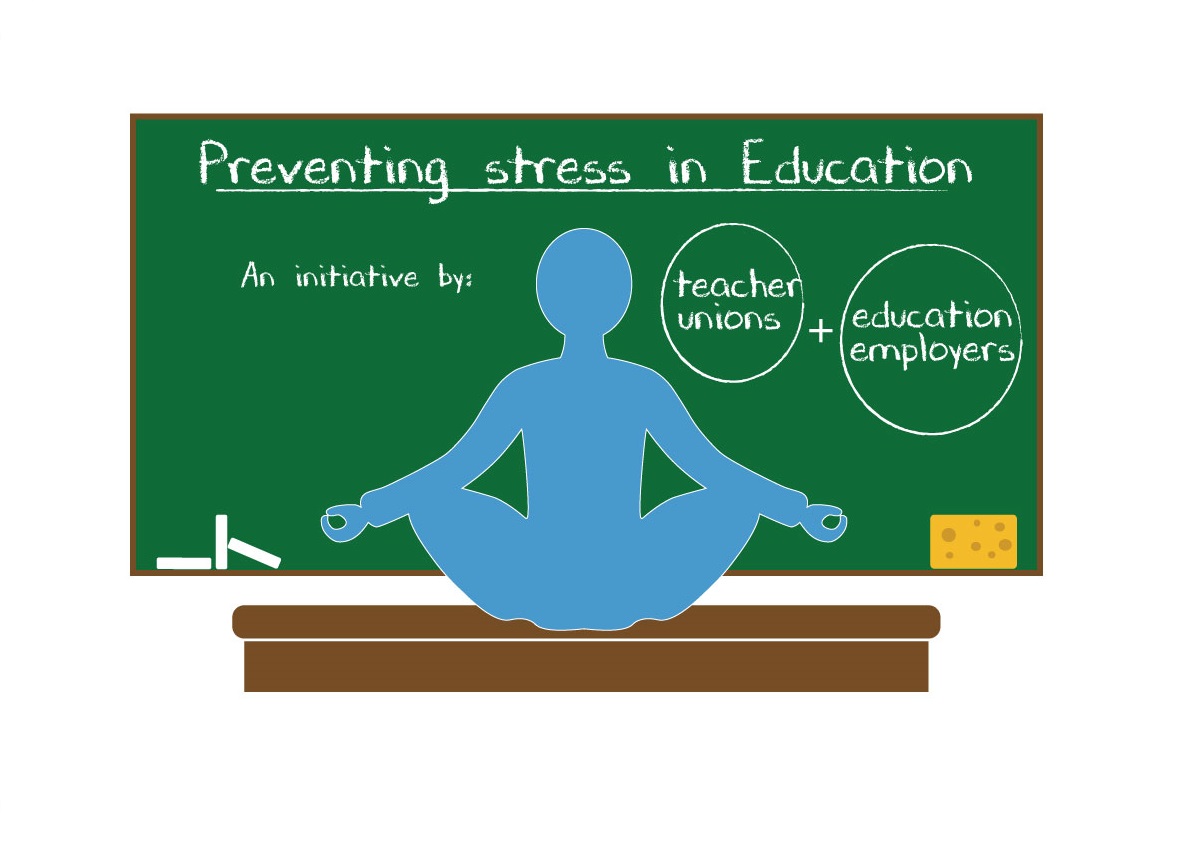
Related topics
Description
Addressing the overarching EU employment and social policy challenges, this project strived to contribute to the success of the EU's health and safety strategic framework. Acknowledging the fact that work-related stress and psychosocial risks have negative effects on health and also impose a significant financial burden on individuals, organisations and societies, this project aimed to promote social partners' initiatives to promote healthy and safe workplaces in the education sector for a healthier working life as a prerequisite for quality education. The project sought to identify concrete and practical ways to prevent and combat work-related stress in education with a focus on joint social partner initiatives and to develop concrete and practical guidelines on how to promote joint social partner initiatives at national, regional and local level to prevent and combat psychosocial hazards in education.
Advisory Group
The advisory group was responsible for carrying out the planning, organisation and evaluation of the project. The members came from four national education trade unions and from three national or European employers' federations. They were chosen to ensure a geographical spread and to enable an exchange of expertise on the different scenarios of occupational health and safety in education in Europe.
The advisory group consists of:
-Alexandra Cornea, FSLE, Romania
-Patricio Perez, FECCOO, Spain
-Sarah Lyons, NUT, United Kingdom
-Stéphane Vanoirbeck, SEGEC, Belgium
-Tari Aho, Association of Finnish Independent Education Employers, Finland
-Ute Foit, VBE, Germany
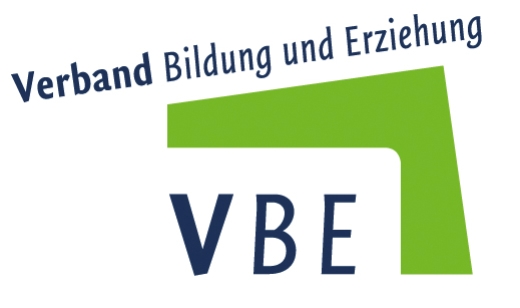


![]()
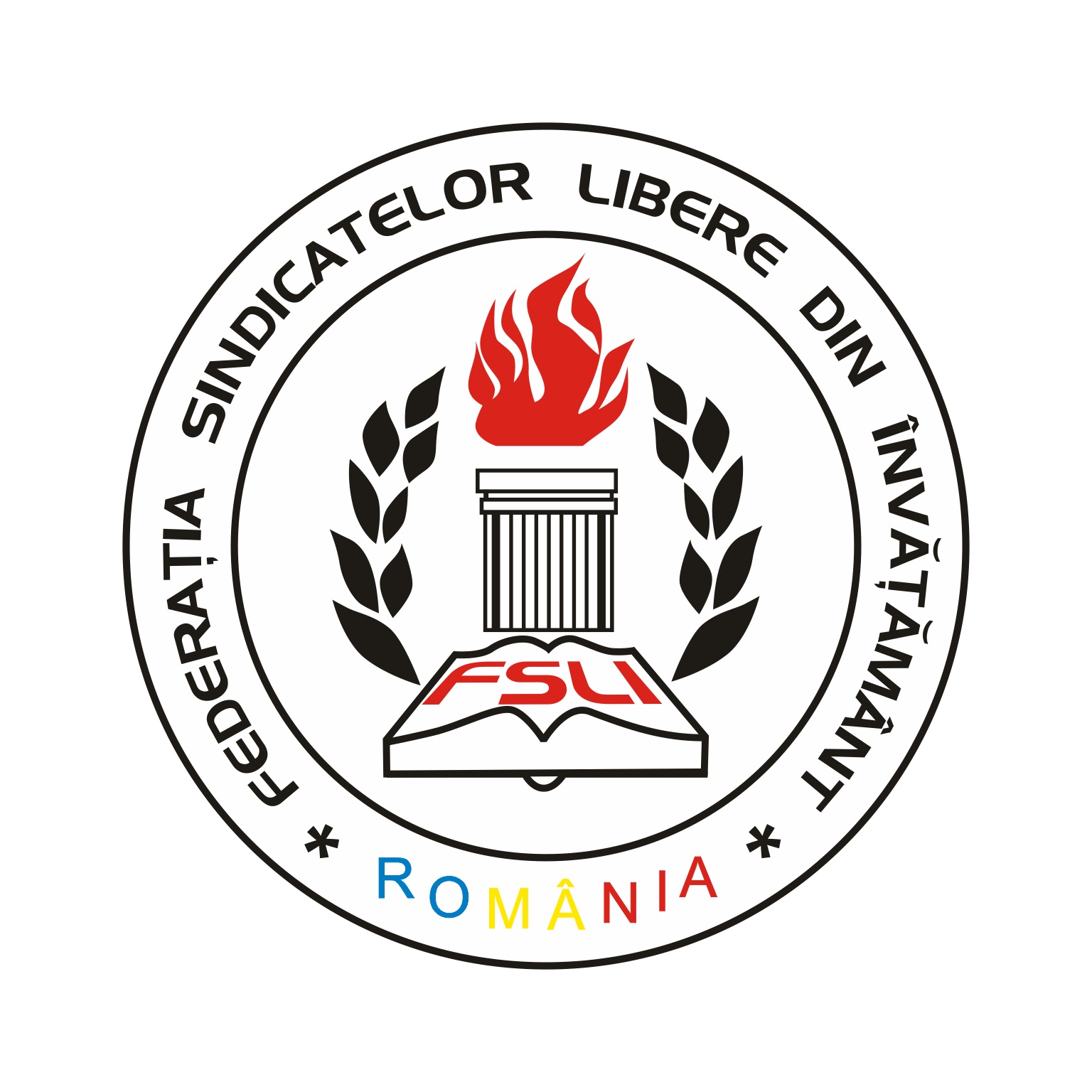

Activities
Case Studies
The advisory group, together with the research experts, prepared the case studies for the identification of practical and concrete ways to prevent and combat work-related stress in education with a focus on joint social partner initiatives. The film team accompanied the case studies and prepared a short video on the project.
1st Case Study: Romania
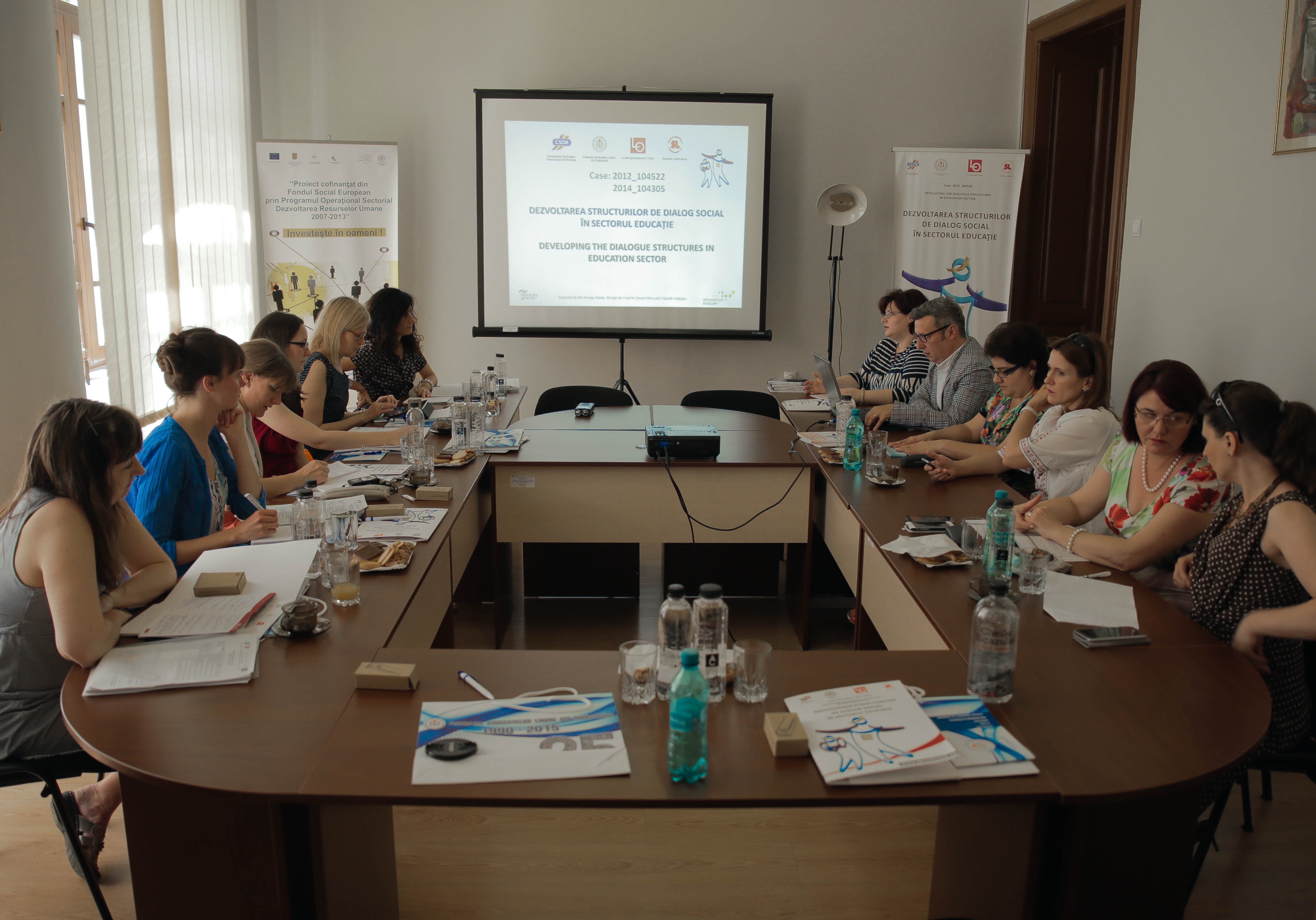 The first case study from 19 to 22 May 2015 took place in Bucharest, Romania and was mainly organised by the ETUCE member organisation Fédération des Syndicats Libres de l'Enseignement (FSLE). The study delegation had the opportunity to meet with a representative of the Romanian Ministry for education and scientific research who explained his point of view on the Romanian education system. The trainers from FSLE who work with teachers on the protection of occupational health and safety explained potential work hazards of teachers and the researcher Valeriu Frunzaru presented the study on occupational health and safety in schools and kindergartens in Romania. Furthermore the study delegation visited the primary and lower secondary Princess Margareta School and the upper secondary Alexandru Ioan Cuza School in Bucharest. Both schools provided excellent examples and ideas on the prevention of work-related stress and the positive effects of team building measures.
The first case study from 19 to 22 May 2015 took place in Bucharest, Romania and was mainly organised by the ETUCE member organisation Fédération des Syndicats Libres de l'Enseignement (FSLE). The study delegation had the opportunity to meet with a representative of the Romanian Ministry for education and scientific research who explained his point of view on the Romanian education system. The trainers from FSLE who work with teachers on the protection of occupational health and safety explained potential work hazards of teachers and the researcher Valeriu Frunzaru presented the study on occupational health and safety in schools and kindergartens in Romania. Furthermore the study delegation visited the primary and lower secondary Princess Margareta School and the upper secondary Alexandru Ioan Cuza School in Bucharest. Both schools provided excellent examples and ideas on the prevention of work-related stress and the positive effects of team building measures.
The short case study film provides an overview about the case study in Romania:
2nd Case Study: Finland
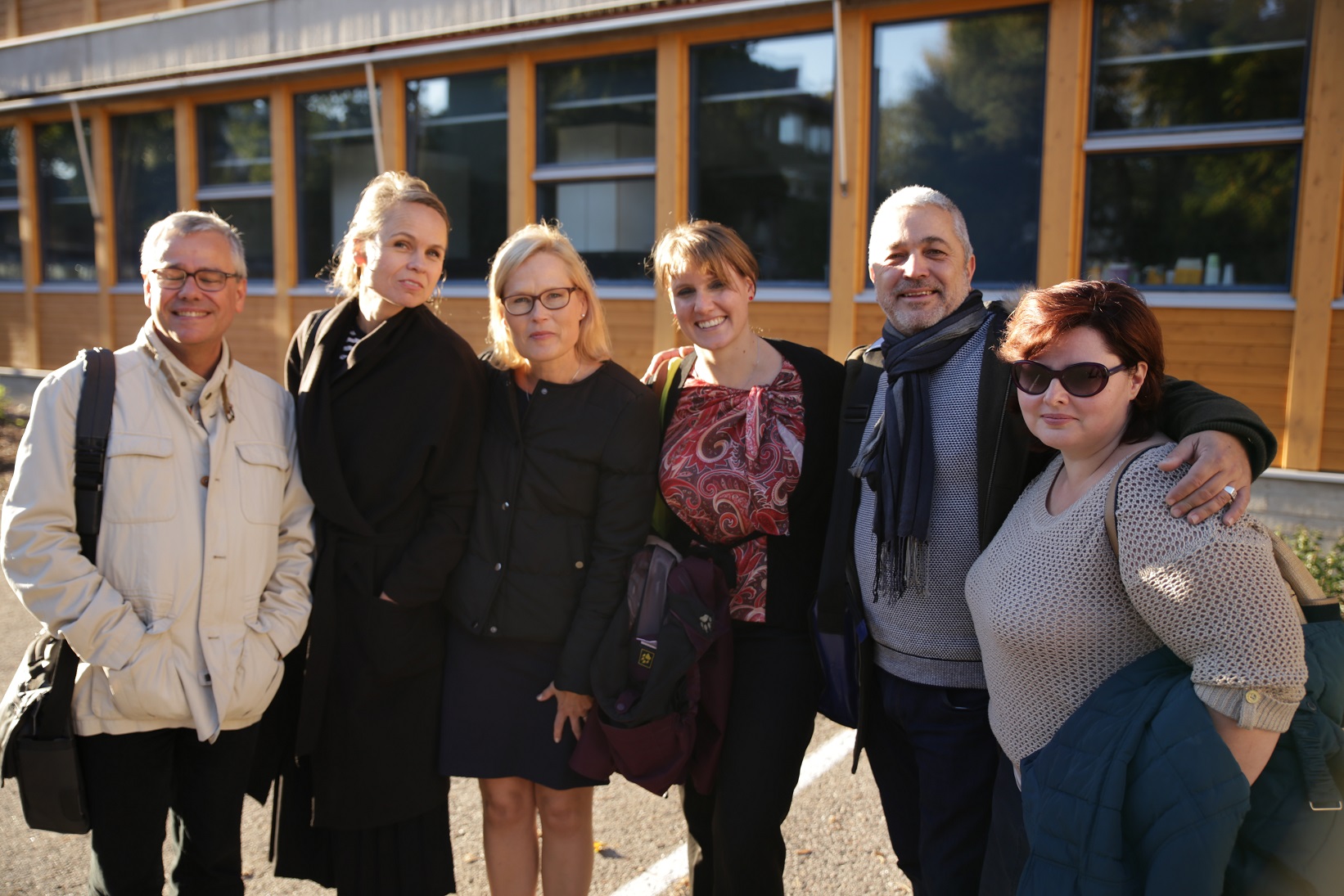
More practical advice on social partner initiatives on tackling psychosocial risks were highlighted by the expert Päivi Rauramlo from the Centre for Occupational Safety and from Riina Länsikallio, from ETUCE member organisation, OAJ.
The study delegation visited the secondary schools Kulosaaren yhteiskolou and SYK Suomalainen yhteiskolou in Helsinki. Both schools provided examples of a teaching profession that is highly valued in the Finish society, founded on trust and the autonomy of teachers, and providing a solid basis for the prevention of work-related stress.
The short case study film provides an overview about the case study in Finland:
3rd Case Study: Belgium
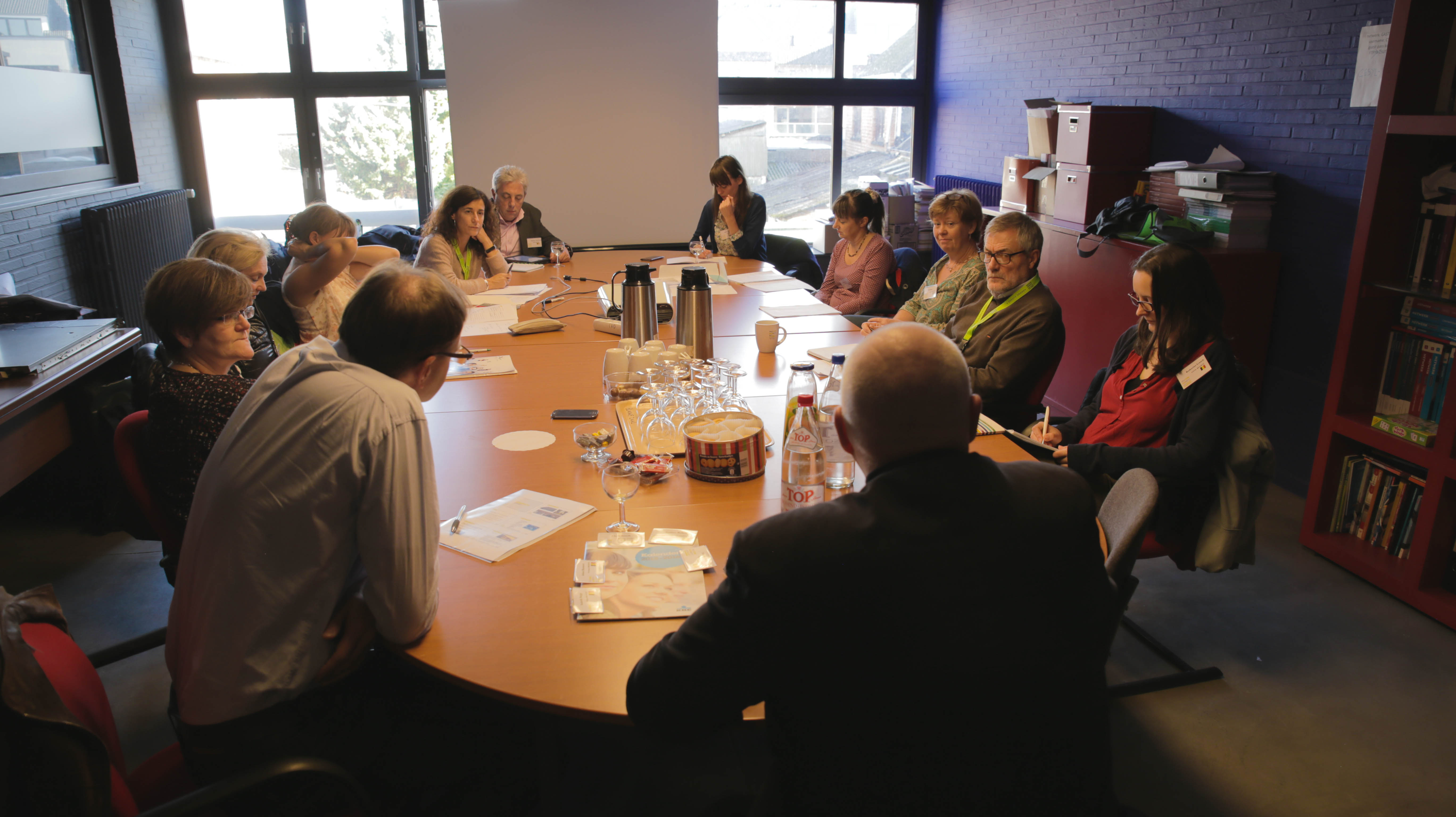 From 26 to 27 October 2015, the third case study of the project Social Partners promoting Decent Workplaces for a Healthier Working Life in the Education Sector took place in Belgium. In the project ETUCE and EFEE (European Federation of Education Employers) aim to find concrete ways to prevent work-related stress in the education sector. The case study was mainly organised by the EFEE member Secrétrariat Général de l’enseignement Catholique en Communautés Française et Germaphone (SeGEC)
From 26 to 27 October 2015, the third case study of the project Social Partners promoting Decent Workplaces for a Healthier Working Life in the Education Sector took place in Belgium. In the project ETUCE and EFEE (European Federation of Education Employers) aim to find concrete ways to prevent work-related stress in the education sector. The case study was mainly organised by the EFEE member Secrétrariat Général de l’enseignement Catholique en Communautés Française et Germaphone (SeGEC)
The study delegation had the opportunity to meet with teachers and school leaders of the lower and upper secondary school Saint Joseph Ciney in Wallonia and the lower and upper secondary school and vocational education and training Institute Vrij Technisch Instituut (Vrij) in Aalst in Flanders. With the aim to provide support for professional newcomers in the teaching profession and to tackle the high rate of teachers leaving the profession prematurely, the two schools have implemented mentoring programmes. Young professionals suffer from high pressure at the beginning of their career and often face difficulties in organising their work, in addressing parents’ demands and other issues. This is often due to the fact that they have not received enough practical training on how to overcome challenges of the profession. The mentoring programmes give teacher novices the opportunity for an exchange with more experienced colleagues on these problems.
During the meeting with the Flemish Education Employers, Katholiek Onderwijs Vlaandern and GO! onderwijs van de Vlaamse Gemeenschap, the study delegation exchanged further ideas regarding the challenges and opportunities on the prevention of work-related stress and psychosocial hazards in education. They had the opportunity to discuss with a representative of the Belgian Psychosocial Risk Unit Department, who gave an overview about the legislation on health and safety at the workplace in Belgium.
The short case study film provides an overview about the case study in Belgium:
4th Case Study: Germany
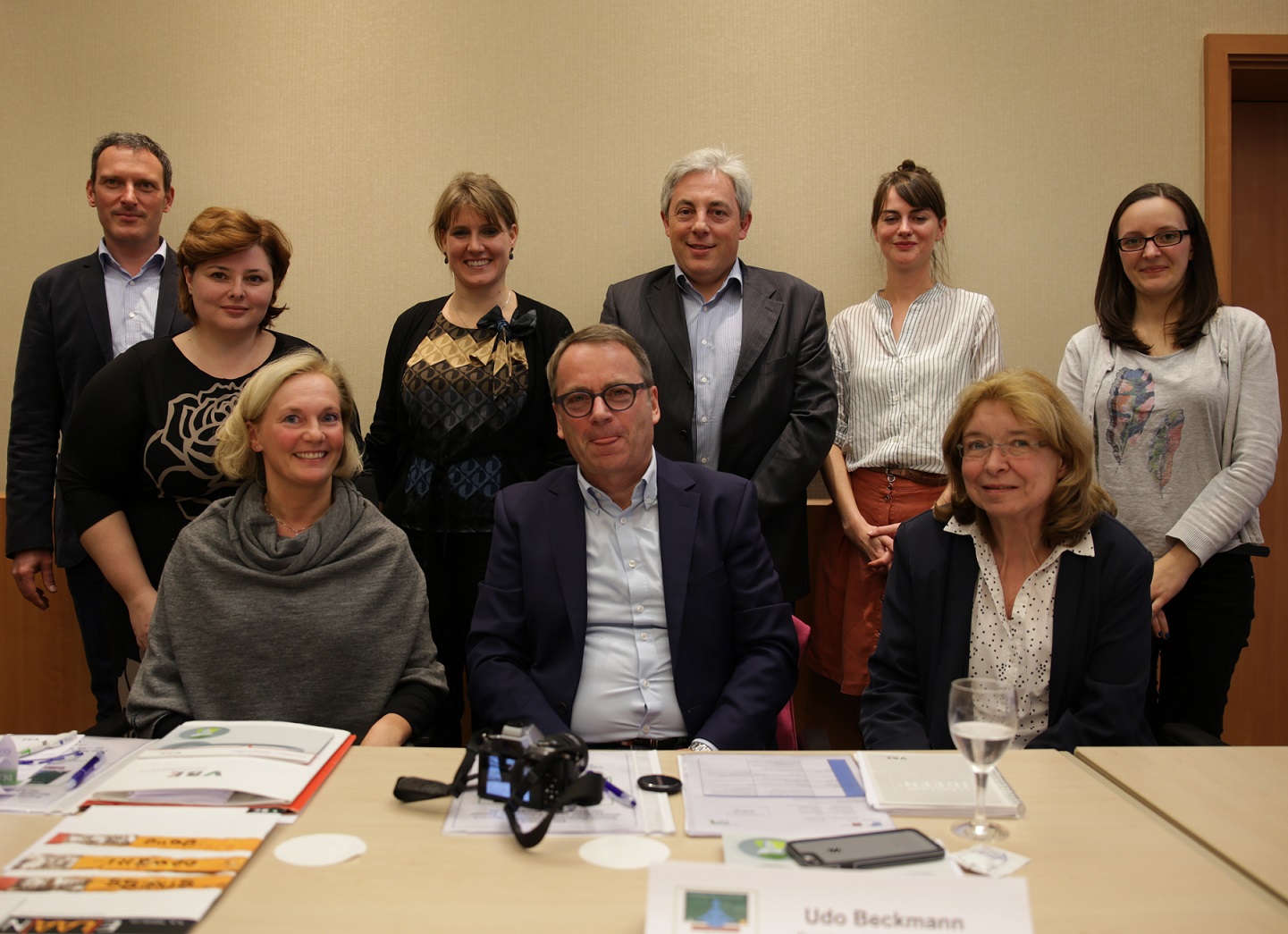
The study delegation visited the primary school Richterich where they learned about the positive impact of good time management on the prevention of work-related stress. Based on training sessions provided by the VBE, the school leadership had learned how to obtain a better balance between working time and leisure time for the teachers at their school. At the Hauptschule Kogelhäuser education staff has been introduced to the programme ‘education and health’ by the Ministry for Schools and Further Education of North Rhine-Westphalia. The programme was implemented in 2013 and promotes a holistic approach to support schools in improving health related frameworks for teachers and pupils. The Secretary of State of the Ministry of Schools and Further Education presented the project from the employers’ point of view and highlighted the important role of schools to increase health awareness in society.
The short case study film provides an overview about the case study in Germany:
Survey
ETUCE and EFFE launched a short online survey among their member organisations on the prevention of psychosocial hazards, such as work-related stress, in the education sector. The online survey aimed to collect evidence on existing occupational health and safety legislation, social partner agreements and measures, and actions undertaken at school level as regards the prevention of psychosocial hazards and work-related stress. ETUCE has been supported by the research team FFAW (Freiburg research centre for occupational science) in Germany in carrying out the survey.
The preliminary results show, that out of the 55 organisation which participated in the survey, 19% implemented or participated in social partner initiatives on the prevention of work-related stress. They were developing more opportunities for professional development, tackling bullying and harassment among students and preventing third party violence against teachers. The most important success factors such as the greatest challenges for measures are the allocation of sufficient time and financial resources. Furthermore they defined the cooperation between social partners and involvement of social partners as decisive success factors. Other factors which challenged initiatives on the prevention of work-related stress were the lack of support by the employers in education and insufficient training and prevention measures. The most successful initiatives were involved in the area of reduction of job insecurity, improvement of relationships between teachers and parents and above all in collecting data on teachers' work-related stress.
The final survey results were summarised in the research report and discussed at the training seminars in Madrid and London and presented at the closing conference in June 2016.
Two regional training seminars
The results of the online survey and the case studies provided the background for two regional one-day training seminars for 30 participants from ETUCE and EFEE member organisations. The training seminars offered the participants the opportunity to examine the online survey outcome and the best practices collected in the case studies. These were expected to be different national approaches for school leaders, teaching staff, teacher unions and employer federations to proactively set-up strategies on the prevention of psychosocial hazards in schools and address these in collective agreements and national social dialogue structures. The seminars addressed the question of which measures education employees and employers can develop together to prevent psychosocial hazards and work-related stress at school level.
1st Training Seminar: Madrid
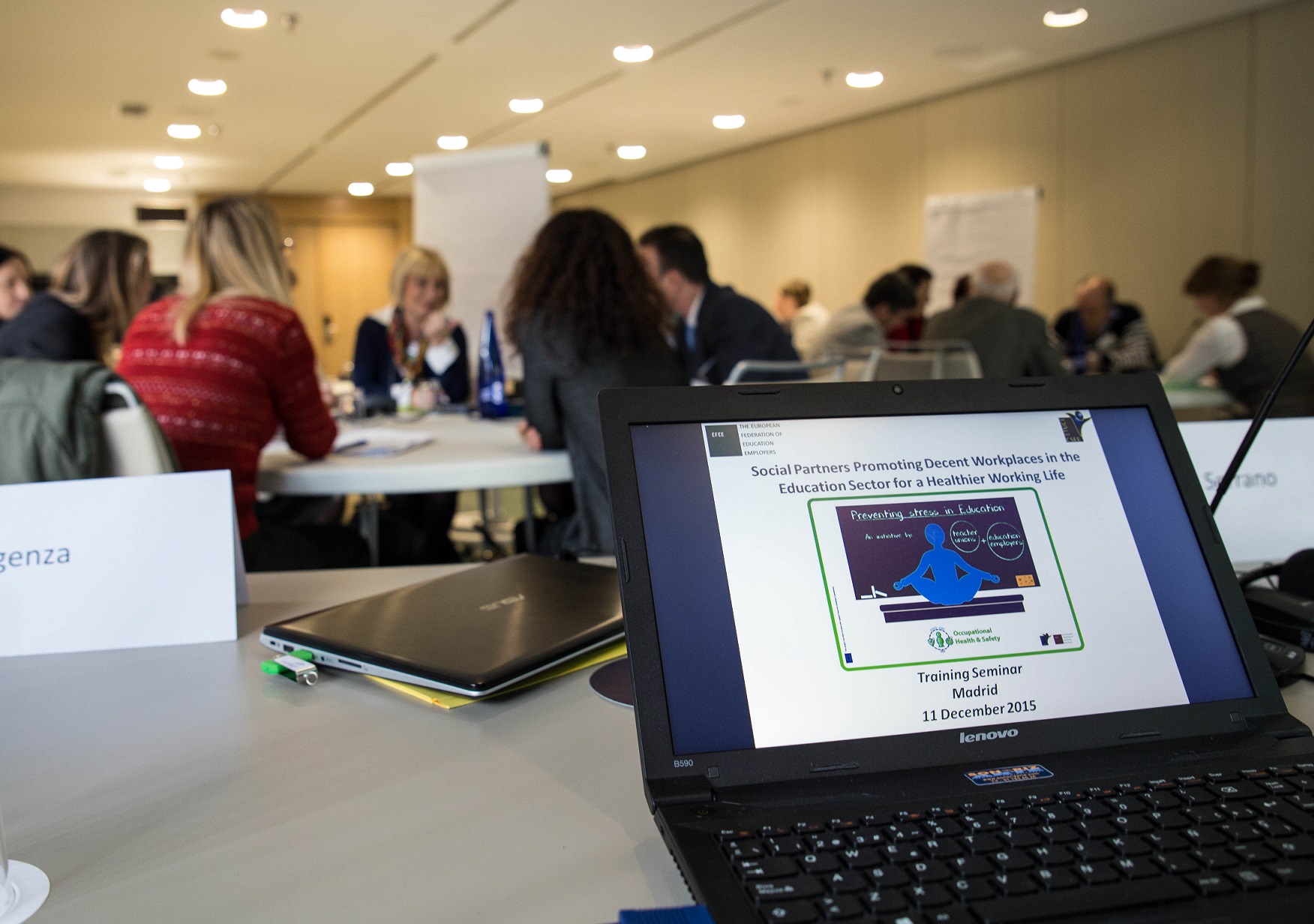 At the training seminar 30 representatives from ETUCE and EFEE member organisations had the opportunity to discuss about the results of the online survey, debate about the good practice examples and exchange experience on tackling psychosocial hazards and work-related stress on national level. During a series of presentations the participants learned more about the ETUCE social partner project and about psychosocial hazards from a European point of view. Tim Tregenza from the European Agency for Safety and Health at Work (EU OSHA) explained the major risk factors of psychosocial hazards and the national strategies and European legislation which are developed to avoid them. Clara Llorens from the research institute ISTAS (Union Institute of Work, Environment and Health) gave an overview of the research project, introducing the results of the online survey and the four case studies. Carmen Radu, a teacher who participated in the Romanian case study, and Patricio Perez, a member of the advisory group of the project, presented the results of the case studies in Romania and Finland. In the working group sessions the participants shared their own experience and their knowledge on strategies to tackle work-related stress and discussed about guidelines in averting psychosocial hazards. Pictures
At the training seminar 30 representatives from ETUCE and EFEE member organisations had the opportunity to discuss about the results of the online survey, debate about the good practice examples and exchange experience on tackling psychosocial hazards and work-related stress on national level. During a series of presentations the participants learned more about the ETUCE social partner project and about psychosocial hazards from a European point of view. Tim Tregenza from the European Agency for Safety and Health at Work (EU OSHA) explained the major risk factors of psychosocial hazards and the national strategies and European legislation which are developed to avoid them. Clara Llorens from the research institute ISTAS (Union Institute of Work, Environment and Health) gave an overview of the research project, introducing the results of the online survey and the four case studies. Carmen Radu, a teacher who participated in the Romanian case study, and Patricio Perez, a member of the advisory group of the project, presented the results of the case studies in Romania and Finland. In the working group sessions the participants shared their own experience and their knowledge on strategies to tackle work-related stress and discussed about guidelines in averting psychosocial hazards. Pictures
2nd Training Seminar: London
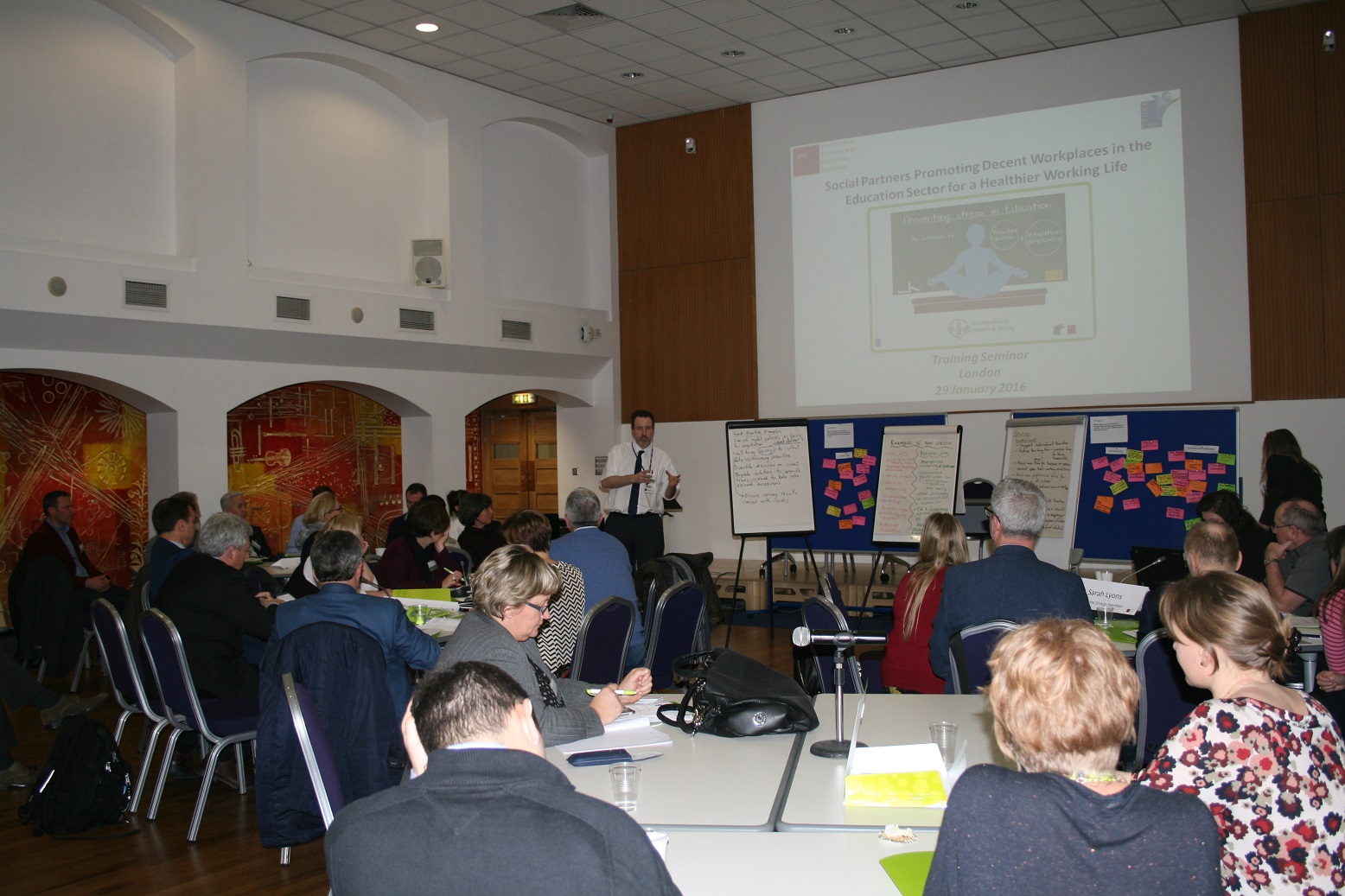
Closing Conference
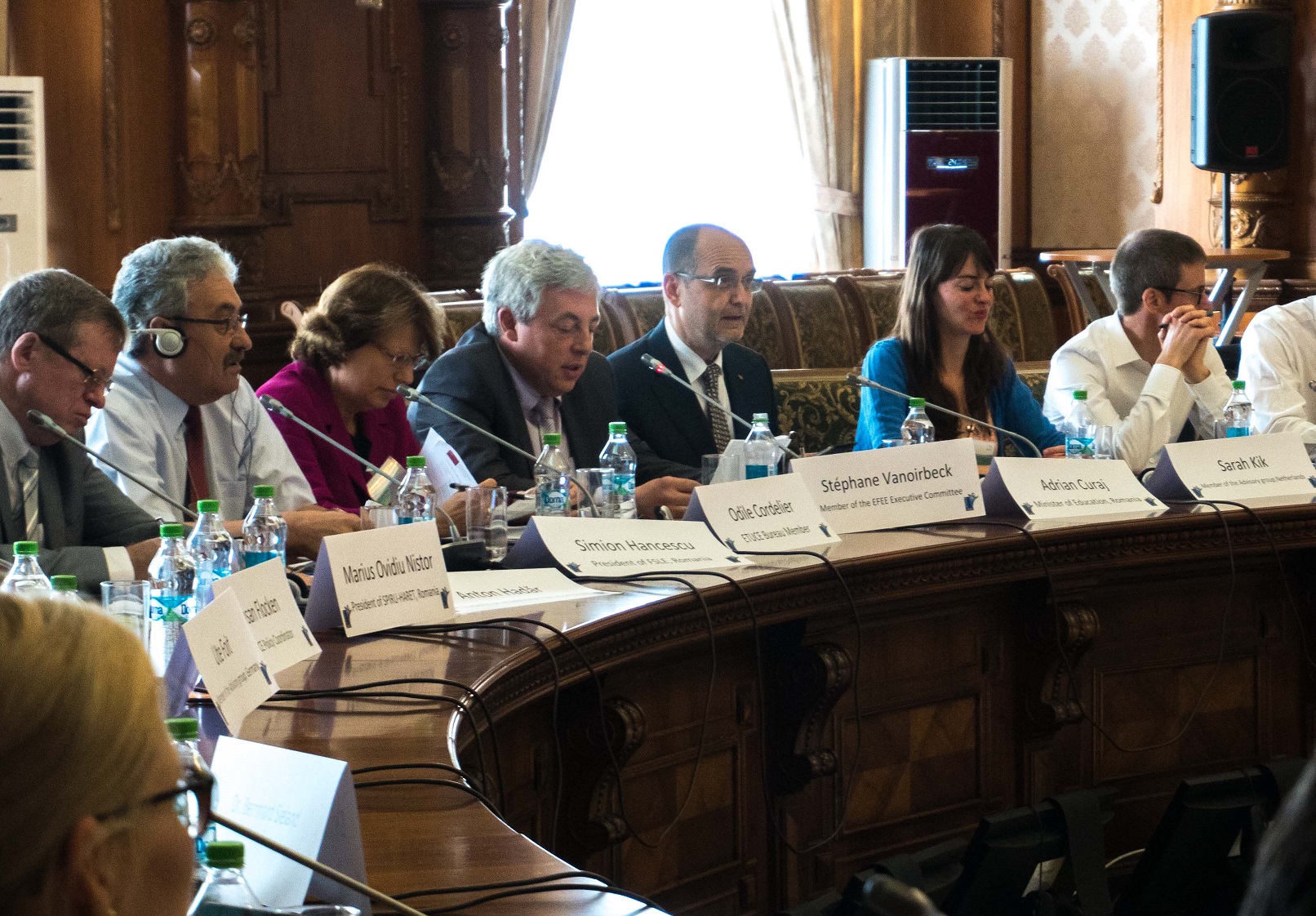 The Conference held in Bucharest on 9-10 June 2016, brought together more than 70 representatives of education trade unions, education employers, teachers, school leaders and other education stakeholders from all levels of education. Via multiple presentations, participants were introduced to and gained a deeper understanding of a number of topics related to psychosocial hazards and work-related stress in the education sector.
The Conference held in Bucharest on 9-10 June 2016, brought together more than 70 representatives of education trade unions, education employers, teachers, school leaders and other education stakeholders from all levels of education. Via multiple presentations, participants were introduced to and gained a deeper understanding of a number of topics related to psychosocial hazards and work-related stress in the education sector.
Echoing the words of welcome from Stéphane Vanoirbeck, member of the EFEE Executive Committee and Odile Cordelier, Bureau member of ETUCE, Prof. Dr. Bernhard Sieland, from the Leuphana Universität Lüneburg in Germany, drew attention to the need of a healthy working life as the basis for quality education in the keynote speech. He called on participants to raise awareness, to break the taboo of psychosocial hazards in the education sector and to help teachers speak up about work-related stress. More insight in the structure of the EU Strategic Framework on Occupational Health and Safety and its implementation in the education sector as well as some results of the ESENER 2015 study were presented by Tim Tregenza from the European Agency for Safety and Health at Work. Dr. Hans-Joachim Lincke from the research team who had accompanied the project, summarised the project outcomes. The good practices collected in four school case studies in Belgium, Romania, Finland and Germany were screened by the project film. Stefaan Ceuppens, Policy Officer Social Dialogue of the European Commission, informed the participants about the European social dialogue and underlined the key role of European and national social partners in promoting decent workplaces. Furthermore he provided participants with some outcomes and good practice examples on Health and Safety issues from other sectoral social dialogue committees.
In two working groups sessions, participants reflected upon the draft joint practical guidelines on how to promote joint social partner initiatives at European, national, regional and local level to prevent and combat psychosocial hazards in education. They suggested amendments and discussed ways to effectively and efficiently implement the guidelines at European, national, regional and local level. The amended guidelines and results of the discussions are of great importance for the work of the social partners (ETUCE and EFEE) in the European Sectoral Social Dialogue Committee for Education (ESSDE).
Film
The short film of the joint ETUCE and EFEE project on “Social Partners Promoting Decent Workplaces in the Education Sector for a Healthier Working Life” summarises the results of this initiative based on the project online survey, four case studies in Romania, Belgium, Germany and Finland, and two training seminars. The European Trade Union Committee for Education (ETUCE) and the European Federation of Education Employers (EFEE) joint their efforts in this two year project to support the provision of safe and healthy working environments for teachers, school leaders and other education staff of all education levels across Europe.
The film allows you to take a closer look into the specific contexts of the countries that have been examined during the project. Summarising the project results, local teachers and school leaders use the film as a platform to inform education stakeholders about their own experiences of psychosocial hazards and work-related stress in the education sector. Moreover, the film showcases not only some examples of the psychosocial well-being of teachers and school leaders but also offers good practice examples of how schools cope with psychosocial hazards as well as prevent them.
 This project is carried out with the financial support of the European Commission
This project is carried out with the financial support of the European Commission
